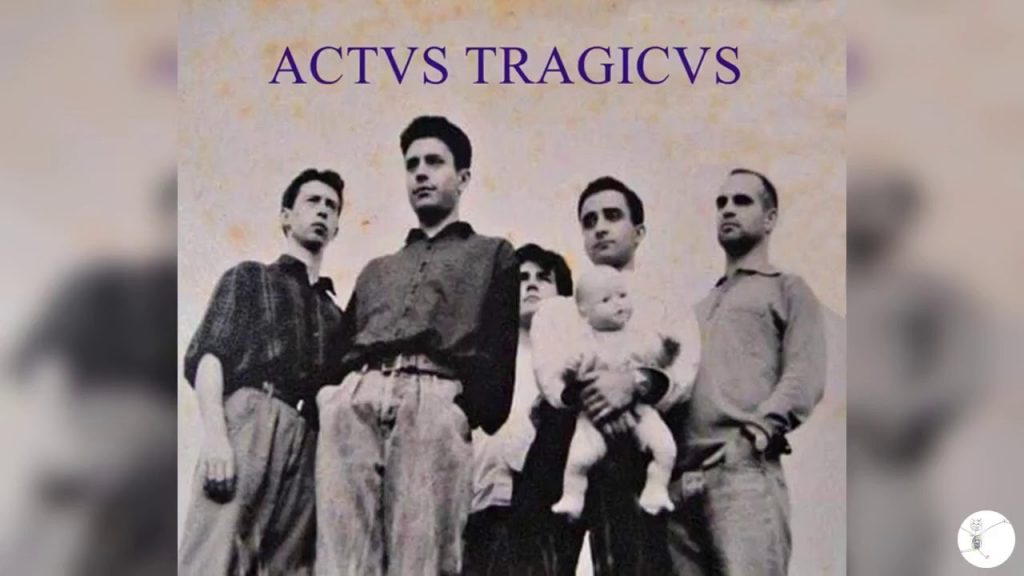Taking its name from a cantata by Johan Sebastian Bach (written as a funeral requiem), Actvs Tragicvs will emerge, during the year 1985, in Almada. Formed by Carlos Vara (vocals and guitar), Pedro Temporão (bass) and Fernado Melancia (drums), they begin to compose, committed to following their own and timeless line. However, they felt the need to enrich their sound, inviting Luís Wire to play second guitar in 1987. During this period, they recorded their first demos and gave their first concerts (including in Porto), accumulating experience and realizing their sonic visions.
However, the group will not remain impervious to inevitable changes in formation, so common in groups that last over time. Thus, Fernando was replaced, in 1988, by Alberto Dondinho, announcing a troubled time in the formation’s stability. Thus, the following year, Dondinho left, replacing José Nave, at the same time that Jorge Fernandes took over as Wire. At the same time, the collective expands, with the entry of Carlos Santos on keys, programming and accordion, expanding the band’s sonic poetry and giving it a greater richness of arrangements and textures.
It is this formation (Vara, Temporão, Fernandes, Santos and Nave) that will record the band’s first official edition, dated 1991, a homonymous cassette-album (through ACT Records itself and distributed by Promotion Tapes – which would later become on Independent Records). The record, sharing studio recordings with live ones, proves to be an excellent surprise, including compositions as brilliant as “Factum” (the best Portuguese song that Sétima Legião never made) or “Sinais Ausentes”. Throughout the tape, one breathes and sweats melancholic atmospheres of eternal nostalgia, of aspirations for utopias of peace and of an intimate lyricism that aims to find an escape from existential despair.
Possessing intense and inventive bass lines, through which, in subtle games of deception, two tenaciously sculpted guitars, discreet but essential keyboard arrangements, and a voice that cries out for the impossible of longing are intertwined, the compositions confront Eternity and they tear part of the veil that covers the face of God. Attracting, from the outset, the insults of countless detractors (as we are living in the aftermath of Madchester, at the same time that the winds were already carrying the sounds of Grunge within them), the album constitutes an affirmation of timelessness, perenniality and refusal to follow the tides of inconstancy. Later that year, they recorded a video for the Pop-Off program, with the theme chosen being, precisely, “Factum II” (a shortened version with some differences from the original).
After its edition, new changes within the band will take place. In addition to the addition of a new vocalist, Roland Popp, who will allow Vara greater creative freedom on guitar, and a second vocalist, Cristina Martins, Fernandes and Nave leave, replaced, respectively, by Paulo Romão and Frederico Cunha. Despite this, and in 1992, a new record saw the light of day, the cassette-EP entitled “Jeune Fille”, also by ACT Records. Some notable differences distinguish it from the previous edition. On the one hand, the vocal register and the use of English as a language of expression (in the previous one, it was Portuguese and French), as well as Cristina’s voice, create new dialectics and ambiences sprinkled with new colors. On the other hand, the atmospheres experienced are closer to more acoustic contours, at the same time as they reveal dissonant tangencies. However, the most important aspect is the appropriation of more experimental aspects, especially in the small instrumental pieces (five in total), three of which (Innocent I & II and Old Boyfriends) will be included in the “Fóssil Sampler” compilation, published by Grito Tapes during that year (which also includes Cello, a project by Pedro Temporão, José Nave, Cristina Martins and Carlos Santos who, during 1992, released their first demo).
Continuing to perform live, they released the cassette-album “Solitaire Train/Comboio Solitário”. Published during 1993, it will contain not only new themes but also re-recorded versions of compositions included in previous records, demonstrating a greater evolution in terms of mastering studio work and, above all, the sonic cohesion resulting from a stable formation, definitively proving the maturity of the project among its detractors. At the same time, Cello recorded their first debut album for Symbiose. During the autumn of that year, they entered the studio again, to record an EP. Intended to be pressed on vinyl, it ends up having to be released on CD, an edition carried out by Independente Records.
Including 4 tracks (one of which, “The Way We Live”, was already part of the “Jeune Fille” lineup), the record constituted an important, but also, and unfortunately, final step in the band’s career. Demonstrating the constant search for new compositional solutions, as well as a better placement of the voice, the album presents a better production, with each instrument demarcating itself more faithfully from the others, while at the same time the complex web in which they interact is perceptible. It thus constitutes, and for many, the culmination of the refinement of a formula in constant development. The highlight will perhaps be the beautiful and seductive “Floating In Time”, while “Liebeslind” presents a possible new direction to follow.
The group still performed a few times and there was even talk of a long-term project, as early as 1995. However, and perhaps because its members found themselves increasingly involved in other projects, the group ended its activities even before the completion of of this record, leaving behind charm and nostalgia, although they still see included, in 1995, in the first volume of the compilation “Deixe de Ser Duro de Ouvido”, the song “The Way We Live”. In 2009, a reference to the band appears in Mick Mercer’s most recent book, “Music To Die For”, coinciding with the growing interest that the band has been arousing everywhere, thanks to the ease with which the internet allows disseminating your work to a wider community.






“Actvs Tragicvs: Dark, intense sounds that captivate and challenge the soul.”
The site’s design really lets the music shine